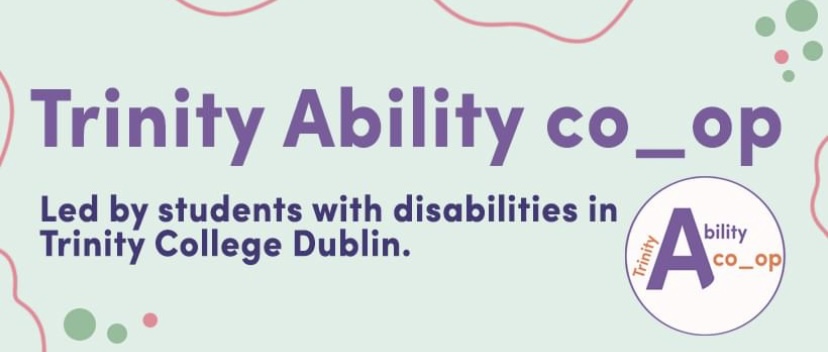This Summer, the Trinity Ability co_op launched its Towards Inclusive Clubs and Societies Project. They describe themselves as an active cooperative movement led by students with disabilities towards creating radical inclusion in Trinity College Dublin. The project is funded by the Trinity Trust, and aims to support the development of clubs and societies that are inclusive to students with disabilities as these students can often be excluded from social aspects of the college experience.
The Trinity Ability co_op wishes to improve the inclusion of disabled students across all clubs and societies. The project strives to make real change in the individual lives of Trinity students and speaking with the project’s leader, Rachel Murphy, we discussed the motives of the project, its contents, and the main issues identified in Trinity’s club and society life.
The Trinity Ability co_op team has created a checklist that asks societies and clubs to answer questions on various elements of running their organisation. Each section asks about specific aspects of inclusion and accessibility, and provides clubs and societies with a starting point towards future change.
Upon completion, they are given a report with solutions to any negative answers, as well as a score out of 30. Those with a score of 25/30 and higher will receive a digital badge that displays to students with disabilities which clubs and societies are welcoming to them. Since the founding of the organisation last year, Murphy revealed that The Trinity Ability co_ op had from the beginning wanted to do a project on clubs and societies: “it’s been great to now actually do it and focus on it.”
“We did a survey last year asking students with disabilities about their experiences with clubs and societies. Some of it was positive but a lot of it was saying that they felt excluded or they didn’t feel welcome”
When asked if she and her team felt that this project was in high demand from students she expressed that it was simply something they themselves felt was needed. “We did a survey last year asking students with disabilities about their experiences with clubs and societies. Some of it was positive but a lot of it was saying that they felt excluded or they didn’t feel welcome,” Murphy said. “I feel like it’s [inclusion] something you hear spoken a lot about, but to actually be given those responses made us see how big of a problem it is”.
The Trinity Inclusive Clubs and Societies Guidelines of the project outline how to become inclusive to disabled students in detail. It is student-focused and provides information about running a student organisation along with disability etiquette, planning an event, social media accessibility, and inclusive physical and social environments. On creating material for the inclusivity project, Murphy said: “I think we had to really identify what the problems were and give solutions, not just come up with solutions for problems that already exist.”
The project’s training videos also offer an overview of the Towards Inclusive Clubs and Societies Project’s key recommendations. There are four videos in total: The Towards Inclusive Clubs and Societies Project: An Introduction, The Towards Inclusive Clubs and Societies Checklist, The Role of an Accessibility and Inclusion Officer, and Planning an Accessible and Inclusive Event.
“I got the feeling that they were really happy that it was students with disabilities that were working on the project”
On the issue of applying for the Trinity Trust funding both Linda Doyle, the newly-elected Provost, and the Trinity Equality Office were extremely receptive to the project. “They expressed that they always knew it was a problem, but no one has necessarily addressed it specifically. I got the feeling that they were really happy that it was students with disabilities that were working on the project. It makes it more engaging and a lot more sense. From the start they were very supportive,” Murphy explained.
The Trinity Ability co_op’s Towards Inclusive Clubs and Societies Project has so far been greatly supported by the Central Societies Committee and Dublin University Central Athletic Club (DUCAC). Both organisations have agreed to circulate the project’s resources.
We should all be aware of both visible and invisible disabilities, especially in the life of our fellow students. “In general it’s not in people’s radar in clubs and societies to be always thinking about the inclusion and accessibility of say events before they even think what type of event it’ll be — sometimes this is an afterthought,” said Murphy. She expressed that the Trinity Ability co_op’s goal is to prioritise accessibility and inclusion a lot more and “it’s really not hard to do; it’s just the act of having it in your brain while going through all the steps.”
“I think it’s just accepting that people have different experiences, and embracing differences and different ways of communicating.”
Finally, on being asked what she feels everyone should make themselves aware of in relation to students with disabilities, Murphy said: “I think it’s just accepting that people have different experiences, and embracing differences and different ways of communicating.” Of course, rapid change towards perfect inclusion and accessibility for students with disabilities cannot happen overnight — but Trinity Ability’s co_op work brings us rightfully closer.






